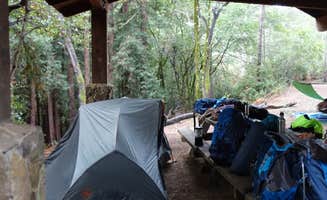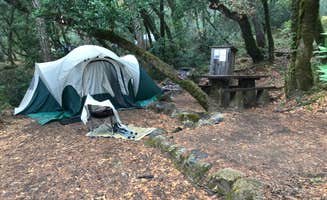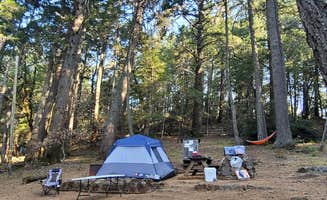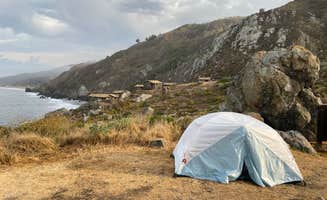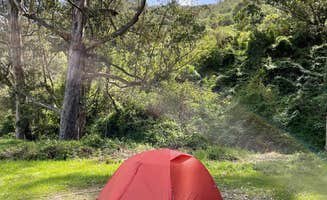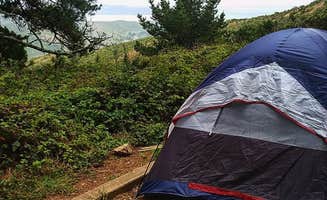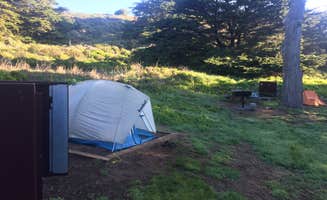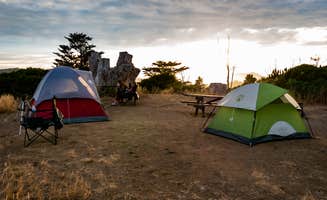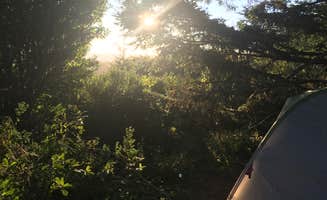Mount Tamalpais rises 2,571 feet above sea level, creating a diverse landscape for tent camping near Ross, California. The region's Mediterranean climate means summer camping can be dry with temperatures averaging 70-85°F during the day, while coastal sites often experience fog and cooler conditions. Campers should note that many trails connecting these campgrounds traverse steep terrain with elevation changes of 1,000+ feet between valley floors and ridgetop sites.
What to do
Hike to ocean views: From Wildcat Campground in Point Reyes, take a short 2-mile round-trip hike to Alamere Falls. The waterfall flows directly onto the beach, creating a rare tidefall. "The campground is in the middle of a grass field... It's really a good thing as whom wants to wake up in the middle of a field on fire," notes a camper who appreciated the beach-only fire policy.
Explore historic sites: Visit immigration and military buildings on Angel Island State Park, accessible via a short ferry ride from Tiburon. "The island itself is about a 5 mile hike from one end to the other with a very modest elevation gain so it's definitely worth doing," reports one visitor who appreciated the island's Immigration Museum.
Stargaze from ridge campsites: Clear nights at higher elevation sites offer excellent star viewing. At Sky Campground, campers report impressive night skies: "The only sounds I heard as I fell asleep were distant, crashing waves and calm winds rushing through the trees." Sites 10 and 11 provide the best ocean views.
What campers like
Privacy between sites: At Pantoll Campground, the hillside layout creates natural separation. "Sites are fairly close together in bunches, but there was a bit of space between the groups," with sites higher up the hill offering more seclusion from day-visitor traffic.
Easy access from San Francisco: Many campsites are surprisingly close to urban areas. The Haypress Campground offers a quick escape: "I first stayed here as a kid decades ago, but some things never change. Love having this close-in spot; the trailhead is only minutes from San Francisco."
Coastal wildlife encounters: Animal sightings are common at several campgrounds. One camper at Steep Ravine noted, "The wildlife is off the hook..I've seen deer in the seaside vernal pools, wild miniature ocean bunnies boxing in the morning sunshine, and a great white shark off the cliffs one fine day."
What you should know
Reservation challenges: Many campgrounds book up months in advance. For Steep Ravine Campground, "you need to be ready to click 'reserve' on the website at no less than 5 minutes before the window opens for your dates of interest, which was 6 months ahead of time."
Weather preparedness: Coastal fog can roll in quickly, especially in summer months. Pack layers regardless of forecast. One camper at Wildcat advised: "It can get windy, but low brush provides some protection. Very peaceful and well worth the hike in."
Small wildlife concerns: Field mice and raccoons are common at many sites. At Glen Campground, campers report: "You might want to be on the lookout for small vermin running around the fields and looking to snag any food you've left out." Food lockers are available but additional protection is recommended.
Parking limitations: Several campgrounds have limited parking that fills early, especially in peak season. At Pantoll Campground, "it can be impossible to find a place to park on busy weekends (you'll need to drop your stuff off, find a place to park along the road, then come back to park in the evening when the parking lot clears)."
Tips for camping with families
Best starter backpacking sites: Glen Campground offers a manageable introduction to backpacking for families. "This was our first backpacking trip and we mostly wanted to test our gear. This was perfect for that. 5-mile hike in with some uphill in the last 1.5 miles that was challenging but not too hard."
Low-key beach access: Tennessee Beach is accessible via a flat 1-mile trail from Haypress Campground. "The walk to Tennessee Beach is very flat and level and doable for kids," notes a repeat visitor.
Water conservation strategies: Several campgrounds have limited water access. At Bicentennial Campground, bring extra containers: "No water. We backpacked in from the Golden Gate Bridge. There was no place nearby to fill up on water, and had to be extremely conservative in our use."
Tips from RVers
Non-RV alternative options: While most campgrounds near Ross are tent-only, several offer cabin accommodations for those seeking more comfort. At Steep Ravine, cabins include "sleeping platforms for about 6 people split among 3 semi-private rooms" with wood-burning stoves for heat. "There is a separate bedroom, you could sleep 2 couples on beds easily with extra floor space and a small individual bunk for larger families."
Strategic site selection: When reserving a tent site as an RV alternative, consider terrain. At Bootjack Campground, "this is a park and carry campsite—of which you'll have to carry your gear up a couple sets of stairs." Choose sites closest to parking to minimize carrying distance.
Cooking considerations: Without hookups, plan for alternative cooking methods. Many sites offer charcoal grills but ban open fires. At Bootjack, "each campsite had a table and bench, wood grill area, and easy access got the restrooms, potable water, and trash cans (that are inside wooden boxes to deter wildlife)."


